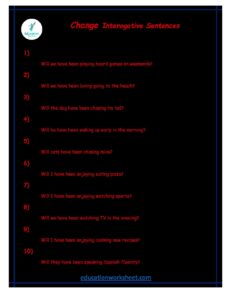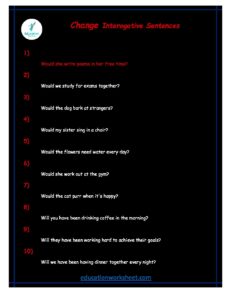Future Perfect Continuous Tense interrogative examples worksheets
Future Perfect Continuous Tense interrogative examples
Understanding the Future Perfect Continuous Tense:
The Future Perfect Continuous Tense is formed by combining “will have been” with the base form of a verb and adding the present participle form (-ing) to the main verb. The structure of an interrogative sentence in this tense typically starts with the modal auxiliary verb “will,” followed by “have been,” and the base form of the main verb, and finally, the “-ing” form of the verb. It is used to express actions that are expected to be ongoing in the future up to a specific point.
For example, consider the verb “study.” To form the Future Perfect Continuous Tense interrogative sentence, you would say, “Will you have been studying?” This sentence structure emphasizes that the action of studying will continue up to a certain future moment.
Usage of Future Perfect Continuous Tense:

- Duration of Actions: The Future Perfect Continuous Tense is used to emphasize the duration of an action that will be ongoing up to a specific point in the future. This tense helps convey how long an action will have been happening.
- Will you have been working here for ten years by 2030?
- How long will you have been waiting when the bus finally arrives?
- Future Events with Ongoing Actions: It is often used to discuss future events or situations where an ongoing action is relevant, such as progress, effort, or continuity.
- Will they have been building the bridge for six months by the time it’s completed?
- How many pages of the book will you have been reading when I call you?
- Expectations and Predictions: The Future Perfect Continuous Tense can also be used to express expectations or predictions about future actions.
- Will they have been practicing enough to win the competition?
- How much weight will you have been losing by the end of the diet?
Forming Interrogative Sentences:
In interrogative sentences in the Future Perfect Continuous Tense, the question word or question structure typically comes at the beginning of the sentence, followed by the auxiliary verb “will,” “have,” and “been,” and the base form of the main verb followed by “-ing.”
Here’s the general structure: [Question Word/Structure] + Will + Subject + Have + Been + Base Form of Verb + -ing
Examples of Future Perfect Continuous Tense Interrogative Sentences:
- How long will you have been gardening by the time the party starts?
- How many hours will they have been traveling when they reach their destination?
- How much money will you have been saving by next year?
- How many years will she have been teaching at that school by her retirement?
- How many miles will you have been running when the marathon ends?
- How many languages will he have been learning when he graduates?
- How many concerts will they have been attending by the end of the summer?
- How many films will you have been directing in your career?
- How much progress will we have been making in the research project by the deadline?
Structure of the Future Perfect Continuous Tense:

To construct a sentence in the Future Perfect Continuous Tense, you typically need three components:
- Subject: The person or thing performing the action.
- Will have been: The future perfect continuous tense is formed by using the modal verb “will,” followed by “have been.”
- Base form of the verb + -ing: The main action verb is in its base form and is followed by “-ing.”
Structure: Subject + will have been + base form of verb + -ing
Now, let’s delve deeper into the interrogative form of the Future Perfect Continuous Tense, using various examples:
Interrogative Examples:
- Will + Subject + have been + base form of verb + -ing?
- Will you have been studying for three hours?
- Will they have been playing chess all afternoon?
- Will she have been working on the project for a month by next week?
- Will I have been running for an hour by the time you arrive?
- Will he have been cooking dinner when we get home?
- Wh- Questions:
You can use “Wh-” questions (who, what, when, where, why, how) to add more context to your interrogative sentences in the Future Perfect Continuous Tense.
- What will you have been doing for the past five hours?
- Why will she have been practicing the piano all day?
- Where will they have been traveling for a week?
- How long will he have been working at that company before retirement?
- When will you have been writing your novel for a year?
Usage of the Future Perfect Continuous Tense:

- Duration of Actions: The Future Perfect Continuous Tense is used to express the duration of an action that will be in progress up to a certain point in the future.
- By next summer, she will have been teaching at the university for ten years.
- I will have been traveling for a month when I reach my destination.
- They will have been waiting for you for an hour when you finally arrive.
- Emphasis on Progress: This tense emphasizes the continuous and ongoing nature of an action, highlighting the commitment or effort put into it.
- Will you have been studying all night for the exam?
- By the time he finishes his novel, he will have been writing for five years.
- She will have been gardening for hours by the time the party starts.
- Predicting Future Actions: The Future Perfect Continuous Tense is also used to make predictions about future events based on the assumption of continuous action.

